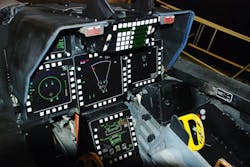Air Force picks SRC for trusted computing research to help safeguard military avionics from cyber attack
WRIGHT-PATTERSON AFB, Ohio – U.S. Air Force researchers needed new ways to identify and mitigate vulnerabilities to military avionics from cyber attack. They found their solution from SRC Inc. in North Syracuse, N.Y.
Officials of the Sensors Directorate of the Air Force Research Laboratory at Wright-Patterson Air Force Base, Ohio, announced a $60 million seven-year contract to SRC last Wednesday for the Radio Frequency (RF) Electronic Warfare (EW) Focused Laboratory Evaluations of Critical Technologies (REFLECT) program. SRC prevailed in this contract competition over four other defense companies.
This trusted computing contract provides for exploring new and emerging concepts related to development, integration, assessment, evaluation, and demonstration of cyber security, open system architecture, novel avionics, sensor technologies, and multi-domain technologies focusing on the electric warfare piece of the avionics, Air Force officials say.
REFLECT also seeks to develop simulation capabilities necessary to develop advanced sensors and avionics technologies, develop agile electronics architecture, and expand emerging open-systems standards for military weapons. The goal is to explore new and emerging technologies related to fending-off cyber-attacks, cyber security, open system architectures, avionics, and sensors.
REFLECT avionics involve manned, unmanned, autonomous, and remotely piloted vehicles; on-board intelligence, surveillance, and reconnaissance (ISR) systems; EW systems, and munitions.
The specific focus in on advanced RF and digital EW simulations, threat models, sensor evaluations, and cutting-edge technology development in the RF domain.
The contract requires SRC to have Top Secret or Sensitive Compartmented Information (SCI) clearances, and deep knowledge of the information related to International Traffic in Arms Regulation (ITAR) export control regulations.
On this contract SRC engineers will do the work in New York, Virginia, Ohio, and Texas, and should be finished by April 2031. For more information contact SRC online at www.srcinc.com, or the Air Force Research Laboratory at www.afrl.af.mil.
About the Author
John Keller
Editor-in-Chief
John Keller is the Editor-in-Chief, Military & Aerospace Electronics Magazine--provides extensive coverage and analysis of enabling electronics and optoelectronic technologies in military, space and commercial aviation applications. John has been a member of the Military & Aerospace Electronics staff since 1989 and chief editor since 1995.
